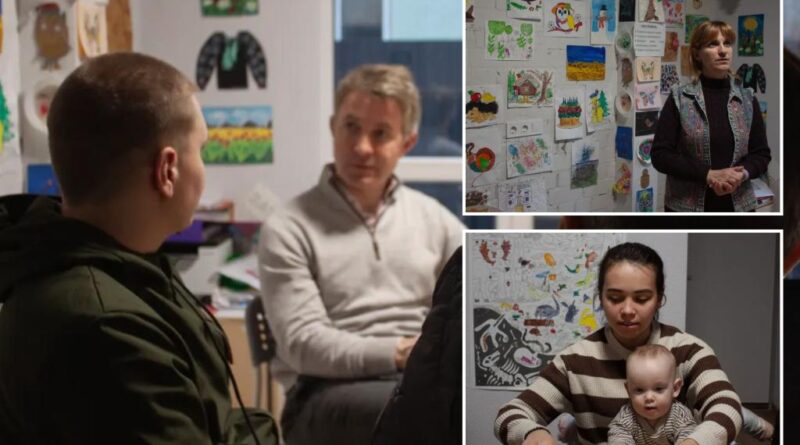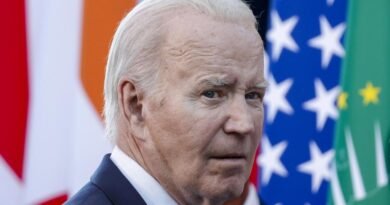Liberate the Ukrainian Children Abducted by Russia

This week marked the three-year anniversary of Vladimir Putin’s so-called “special military operation” in Ukraine, which is widely recognized around the globe as Putin’s “full-scale military invasion” of the nation.
While Ukrainians successfully halted Russian forces from completely overtaking their country in the early days of the conflict, approximately one-fifth of the nation remains under offensive control by the Russian military. The human toll of this occupation is unimaginable.
This week, I returned to Ukraine to witness some of the lesser-publicized effects of Putin’s ongoing war.
An issue gaining increased attention—raised by President Trump last week—is the plight of Ukrainian children who have been kidnapped or held captive by the Russian army since the onset of the conflict.
It has become evident that Russia’s maltreatment of the Ukrainian populace—especially its children—must be a central topic in any negotiations for a ceasefire.
The stolen children all endured the misfortune of being behind what are now Russian lines, specifically in the eastern areas of the country still occupied by Russia.
About 20,000 children have been taken into Russia, some of whom were orphans, while others were separated from their families.
These children will be raised indoctrinated into Putin’s ideology, speaking Russian rather than Ukrainian. Many may even be conscripted into his military. Such actions constitute a war crime.
Those who remain in the occupied territories are scarcely better off.
This week, I spoke with several children from these regions and learned firsthand about the horrific experiences they’ve endured.
A 17-year-old, who wished to stay anonymous, recently escaped with his mother from behind Russian lines.
They made their way out through a lengthy and complicated route—traveling through Russia and Belarus before entering Ukraine from the north.
Having lived under Russian occupation for almost three years, they witnessed the methods employed by the Russian occupiers.
Their neighbor was taken without warning to a Russian prison, where he was detained and tortured, returning home “mentally broken.”
A few weeks ago, while this young man was engaged in online schooling, a woman came to their front door.
She handed him papers and informed him that he was required to sign them. She made it clear that in one week he must report for duty—to the Russian army. Consequently, he and his mother fled, accompanied by three other children.
“Everyone in our neighborhood is waiting to be liberated,” the boy’s mother shared with me. She hopes to return because all that remains is their house and the home of her brother, who was already killed in the war. “Apart from that, we have nothing,” she stated. Just two houses, behind enemy lines.
There are countless stories akin to this. Outside of Kyiv this week, at a shelter operated by an organization called “Save Ukraine,” I met a family of four.
The fifteen-year-old twins Mykhailo and Oleksandra are being looked after by their 21-year-old sister Daria, who is also caring for her one-year-old baby.
They recently escaped from the Kherson region, where they lived under Russian occupation for three years with their grandfather.
The only schools available in their area since the invasion are those controlled by Russian authorities, which focus on teaching the Russian language and instilling Putin’s values.
Thus, the twins were confined to their home for three years, attempting to learn online. “Why?” I inquired. “Fear,” the brother replied. “The Russians are always patrolling, asking for papers and more.”
They described how the Russians have cunningly ensnared ethnic Ukrainians. Some of their friends were sent to summer camps that the Russians claimed were for Ukrainian children.
They never returned. The Russians simply took the Ukrainian children and separated them from their families for re-education or worse.
What did they do when Russian troops visited their home? “Our grandfather lied and said that there were no kids in the house.” Whenever soldiers knocked on the door, the children hid.
Will they ever return? “Yes—after the war,” they all replied.
Yet, it is hard to envision an end to the conflict or any semblance of peace in regions that Putin’s forces have ravaged for years.
Another boy, Dmytro, 15, is now alone. He managed to escape from the Russian-occupied regions (also via Belarus) last November.
Life under Russian occupation was, he conveyed, a state of “constant fear, panic, and paranoia.”
He recounted how, in early September, Russian special forces disguised in civilian attire and wearing flak jackets knocked on the door of his family home.
They entered and seized all family phones and documents. Then, they took Dmytro’s mother outside to interrogate her. Upon returning, they said they needed to take her for a “proper” interrogation.
Dmytro’s father demanded, “Why take her and not me?” The soldiers responded, “We know what we’re doing.”
Later that day, Dmytro’s older sister received a video call from their mother’s phone. A Russian soldier on the line stated that their mother had two options: she could “cooperate” or “mum is going to prison.”
They then showed her a video of her mother in a cell, handcuffed to a water pipe.
After two weeks, authorities presented Dmytro’s father with a document “signed” by her, stating, “I reject my family and am starting a new life.”
However, Russian forces often fabricate claims. Recently, the Russian Secret Service (FSB) released a video of one of Dmytro’s neighbors.
They alleged she was plotting explosions when, in fact, they had abducted her nine months earlier.
Dmytro is aware of only two facts regarding his mother’s situation. Like many others arrested, she is now accused of “Possible cooperation with Ukrainian forces.”
He also knows that after her abduction, she was subjected to torture, witnessing someone else being tormented using electrodes. The Russians presumed that this would coerce her into collaboration.
This drove Dmytro to flee. When he finally reached the northern Ukrainian border, he encountered a Ukrainian soldier. “Am I safe?” was the boy’s first question.
Strangely enough, these children are the lucky ones. They have managed to escape. Countless others remain behind.
Those who haven’t been taken into Russia are in hiding, coerced into “Russification” programs, or forced to serve in the Russian army against their own countrymen.
To assert that these actions are war crimes is to state the obvious. To label them as crimes against humanity is an inadequately fitting description.
What these actions represent is merely a small fraction of the vast number of children that Vladimir Putin has subjected to terror and war since 2022. In a conflict of his making. A conflict he could have resolved at any moment if he had chosen to do so.



